Reflections on My Haiku Journey on Hive
For the past five and a half years on Hive I've been the haiku guy around here. If you know me or find my name at all familiar, it's probably because of this. I have well over 200 or 300 haiku posts, probably more. Surrounding these I have also made a habit of posting about Japanese history, Japanese traditions, and sharing photos of Japan. When @slobberchops says dominate your niche (in this post), I think I come pretty close to exemplifying that on Hive.
In that time I've also tried to emulate @tarazkp (and others) in spreading my writing around into different areas. This has been made easier in recent years with the communities we now have. My focus always seems to drift back to Japan and haiku, though.
So reflections... what have I learned in my Hive journey?
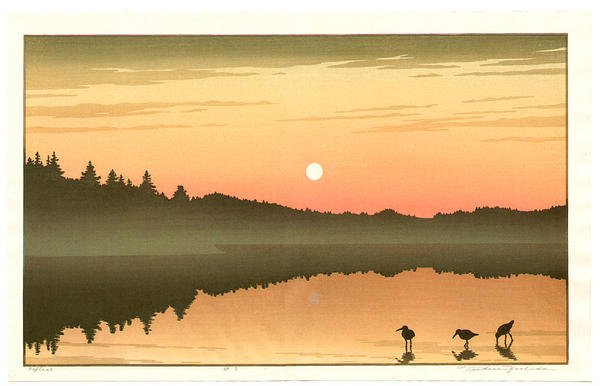

First off, I think I've learned that people don't really care about poetry, especially haiku 😜. No no, this isn't a complaint post. I'd post it in that Rant community if it was. It's more a reflection and what I've learned along the way. Stay with me as I dive in!
When I say I learned people don't care about poetry, I'm not being completely honest. I knew people don't like poetry. I'm not so far away from high school and university that I don't remember how we all groaned whenever the teacher mentioned that we were going to be studying poetry on that day. In school poetry is nonsense to be waded through for a grade. Most of us continue to carry that attitude after school ends. Haiku, if it comes up at all, is nothing more than a syllable counting game and seems even more pointless than "regular poetry".
It's not surprising that most people don't like poetry.
Not long after I joined Hive, the Writers Block was just getting started and they quickly drafted me to be the poetry editor in their group. We had a lot of writers on Hive in those days, a good percentage of them poets. I think being surrounded by that gave me the initial belief that Hive would be a great place for poetry. And it was. Until the Writers Block split a few times and then fell apart due to bickering, and then we had the whole Justin Sun affair... a lot of the good writers and poets we had didn't make the changeover to our new home here on, er, Hive. (In case it wasn't clean, I'm following the example of a lot of people on our network by referring to Steemit pre-split as Hive).
Anyway, so I've been continuing doing what I do ever since.

Outside of Hive I've been immersed in haiku for nearly twenty years. When I moved to Japan I wasn't yet interested, but shortly afterwards a friend suggested joining Twitter and using it for haiku. This was a year or two before the iPhone which was when Twitter really exploded. At the time Twitter looked more like group SMS. We didn't have retweets yet nor even an official reply format. But they did have the short character limit, and that seemed to make it ideal for practicing haiku.
I started by writing haiku as I did in school, basically one sentence broken up into groups of 5 7 5. Doing that for awhile, I became curious about techniques for improvement and started looking up info. One thing led to another, and before I knew it I had a bookshelf full of haiku books in Japanese and English, most of them about the past masters of the craft. Funny how that happened.
I started translating haiku, writing about them, and publishing articles about them.

Reading haiku is an interesting practice. They have taught me more about Japanese culture than I otherwise would have learned. Even now after reading them for so many years, it's not unusual for me to find a reference to some obscure practice from old Japan that no one has done for 300 years but yet all Japanese know about because it influences this thing which influenced this thing which influenced this thing that they still do in some places.
Then there's history. You can imagine how I also come across a lot of history this way. Let me give you one of my favorite examples. Here is one of Bashō's most famous haiku which he wrote in June of 1689.
Natsukusa ya tsuwamono-domo ga yume no ato
the only remains
of the soldiers' dreams
Even without knowing this history this poem is referring to, many people can enjoy it. We can guess it is about some long forgotten conflict, all that remains of which is the summer grass.
Dig in a little though and we can see more. Bashō wrote this at the grass-covered remains of Takadachi Castle, which seven centuries before had been the last hideaway of the once-great Yoshitsune, who had years before aided his half-brother Yoritomo in winning the shogunate and control of Japan.
Long story short after his half-brother became shogun, Yoshitsune quickly got on his bad side and was forced into hiding. He secured the promise of protection from Fujiwara no Hidehira and lived peacefully for a time. After Hidehira's death from old age, his son, Yasuhira, promised to uphold his father's pledge of protection. It didn't last. Seeing his opportunity, Yoritomo was able twist the heart of Yasuhira against Yoshitsune. Yasuhira betrayed him, surrounding his residence and killing everyone within, forcing Yoshitsune to commit seppuku.
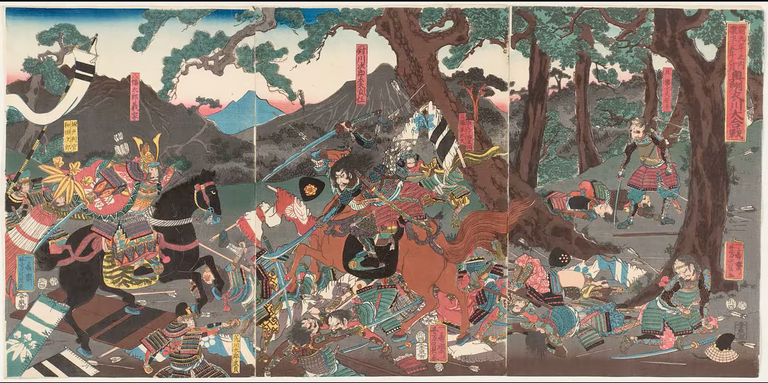
It's this event that Bashō was weeping about as he wrote the above haiku.

Haiku also teaches old literature. Much like Europe in premodern times when everyone was given a classical education and therefore all knew the classics very well and so someone could reference a small episode in the Odyssey, for instance, and everyone would know what they were talking about; in Japan in premodern times, everyone also was much more educated in the classics and could do the same . The classics in this case being old Japanese literature and even older Chinese literature.
I have learned of old Japanese works that I previously never knew existed. And I have been led to old Chinese poets, many of whom are still famous in China but who are virtually unknown outside of it, and their poems.
Here's one of my favorites from Tang poet He Zhizhang:
儿童相见不相识,笑问客从何处来。
My tongue unchanged, my hair now thinner be.
Smiling they ask, “Sir, from whence come thee?”
[not my translation—I don't know any Chinese—but the web page I lifted it from didn't give any attribution]
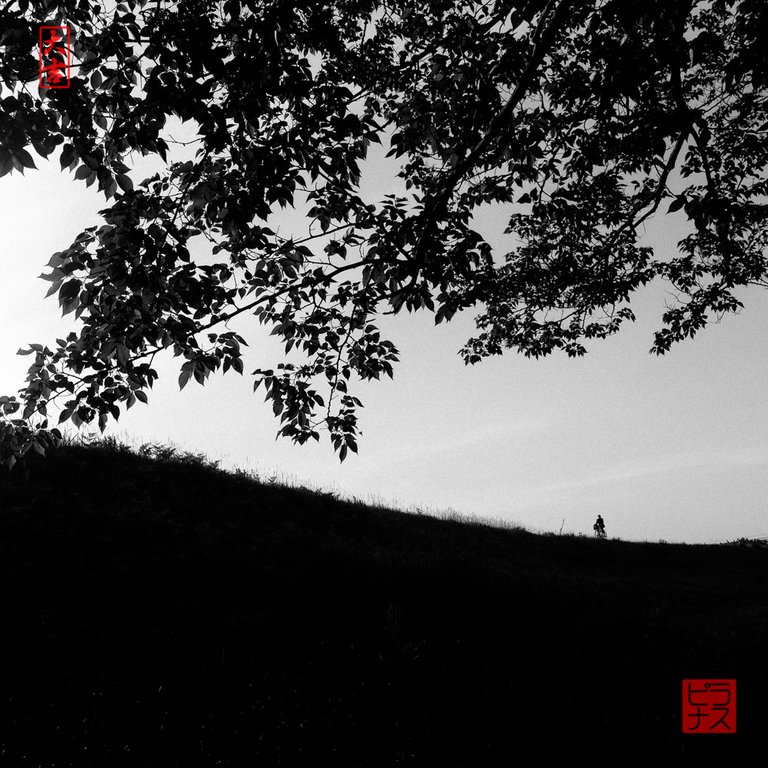
Isn't that great? I discovered that one by way of Buson who referred to it in one of his haiku. I never would have came across it otherwise.
It might go something like this. I read a haiku from Bashō that refers to an older tanka from one of the Imperial anthologies of poetry (it used to be a thing). This poem might in turn refer to a Chinese poem. This Chinese poem then might lead me even further back. It's turtles all the way down, as the saying goes. Eventually I have to give up in my research of I'd be expanding backwards forever.
If you want more Chinese poems, by the way, follow @kaixin. She doesn't post often, but when she does she often shares old Chinese poems and info about them.

I was searching my brain for an example of this and couldn't come up with one offhand, but I did remember this one that highlights some Japanese culture and also points to two old Chinese stories.
From Buson, written in 1772:
gakumon wa shiri kara nukeru hotaru kana
quick to vanish
like the light of a firefly
it's actually a bit of a joke which is hard to show in translation, so I might also translate it this way
like a firefly’s light
easily escapes me
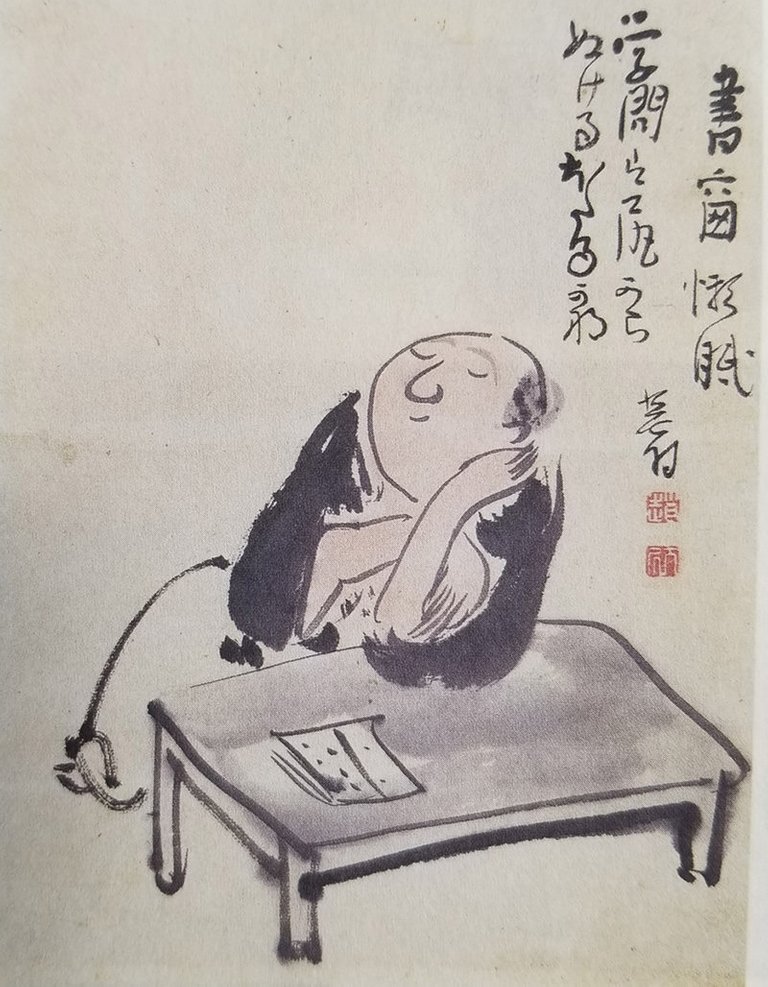
The joke is the second line, shiri kara nukeru, which means the same as our idiom “in one ear, out the other”, but literally says “coming out of the butt”. Yes, a fart joke.
What's the connection between fireflies and great learning, though? Well, there is a famous Chinese folktale about a fellow named Che Yin (车胤), a man from a poor family who couldn’t even afford candles to study by at night. The story goes that he would catch fireflies and wrap them in a cloth bag so that he could read at night.
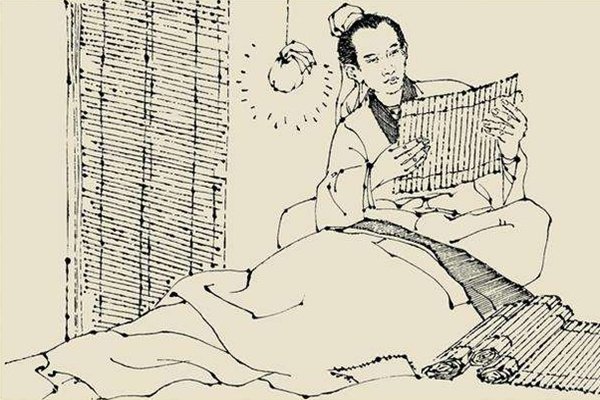
This story goes parallel with a folk story about Sun Kang (孙康), who was in the same situation as Che Yin but used the reflection of moonlight off snow to help him instead of fireflies. In Japan the ideas from these two old stories are illustrated by the phrase keisetsu no kou (蛍雪の功) which literally means “firefly snow success” and is used when your hard work and study has paid off or for expressing the effort itself. There is also a monthly journal for passing the entrance exam for university that has been published since 1941 called keisetsu jidai (螢雪時代), literally “firefly snow era”.
The association between fireflies and learning in Japan carries through even to graduation ceremony, during which they sing hotaru no hikari, "The Glow of the Fireflies". You can listen to that song here:

Well I'm pushing 1500 words here and I know you guys all have places to go and people to see, so let me start to close things up.
My study of haiku has really been educational and fun. Not only is it fun learning myself, but it's fun sharing all of this stuff. These days on Hive I have been limiting my haiku translation posts to only one or two a week, but those are always my favorite posts to write. It's sometimes a challenge to keep them short (I aim for around 750-1000 words) because I have so many things I want to share.
So despite writing in possibly the smallest niche on Hive, I am really enjoying myself and plan to keep this up as long as Hive lasts (which we all hope will be a very long time indeed).
❦


 |
David LaSpina is an American photographer and translator lost in Japan, trying to capture the beauty of this country one photo at a time and searching for the perfect haiku. |
If this blog post has entertained or helped you, please follow/upvote/reblog. If you want to further support my writing, donations are welcome.
Very interesting!
Poetry is treated badly by everyone because, very often, it reflects one's feelings.
I would say almost introspective, and that might make people afraid.
Very interesting poem (or passage about the "summer grass": it reminds me a lot of a famous poem by an Italian writer Ungaretti.
"Soldiers:
You stand like
of autumn
on the trees
the leaves."
To many people it might not mean anything, but in reality being a soldier is like being the leaves of autumn: at any moment you could fall...
Yeah, I'd say that's a fair guess. Feelings in general make us uncomfortable. Hmm... come to think of that, as society moves more in the direction of being more accepting of feelings and the expression of them, I wonder if that will make poetry more popular. Time will tell, I suppose.
I hadn't heard that one before. I like that! Yes, quite similar in feeling to Bashō's poem.
This post has been manually curated by @bhattg from Indiaunited community. Join us on our Discord Server.
Do you know that you can earn a passive income by delegating to @indiaunited. We share more than 100 % of the curation rewards with the delegators in the form of IUC tokens. HP delegators and IUC token holders also get upto 20% additional vote weight.
Here are some handy links for delegations: 100HP, 250HP, 500HP, 1000HP.
Please contribute to the community by upvoting this comment and posts made by @indiaunited.
Thank you @bhattg
https://twitter.com/1463266439520034822/status/1615749559044407298
The rewards earned on this comment will go directly to the people( @dbooster ) sharing the post on Twitter as long as they are registered with @poshtoken. Sign up at https://hiveposh.com.
That was a great read!
Glad to hear you enjoyed it. Thanks!
Your haiku and their attendant explanatory notes are always a highlight for me.
I'm happy to hear that. Thanks for the comment.
Great post! I haven't been active in your community, but this sure makes me want to be.
I love that you research. I would never have recognized the firefly poem as a joke, but rearranged, I can easily see it. I love haiku, both reading and writing. Just posted a poem today, a freewrite, and wish I had used blockchain poets because I see it would easily satisfy this week's prompt.
Glad you enjoyed. Thanks 😃
Your poems are always welcome in our group. Looking forward to your next one!
!LOLZ
!LUV
!PIZZA
@dbooster, @thealliance(4/10) sent you LUV. | tools | discord | community | HiveWiki | NFT | <>< daily
NFT | <>< daily
lolztoken.com
It's just q with a bunch of silent letters waiting in line.
Credit: reddit
@dbooster, I sent you an $LOLZ on behalf of @thealliance
Delegate Hive Tokens to Farm $LOLZ and earn 110% Rewards. Learn more.
(2/2)
lolztoken.com
Thank you for being an !LOLZ supporter.
You must be killin' it out here!
@lolz.pimp just slapped you with 5.000 PIMP, @thealliance.
You earned 5.000 PIMP for the strong hand.
They're getting a workout and slapped 2/3 possible people today.
Read about some PIMP Shit or Look for the PIMP District
I gifted $PIZZA slices here:
@dbooster(3/15) tipped @rks.wuhdrelis (x1)
thealliance tipped dbooster (x1)
Join us in Discord!
Ah, I didn't even realize the blog was ending. I had so much fun reading this! I never thought there would be such influential stories behind those poems.
Thank you for the kind comment 🙂 I'm glad you enjoyed it so much.
!PIZZA
I did enjoy this post. I've never actually read a post so long and enjoyed it so much. I too like writing Haiku but I'm just starting to learn. I believe I learned a thing or two from this post. I wanted to re-blog it but it seems I'm too late. I was in Japan for a while (Okinawa) and I loved being there. I am now retired in the Philippines and can visit Japan (or Korea and other Asian countries) as soon as I can acquire enough money to make it worth the trip. I will be looking for your Haiku's and try to learn from them.